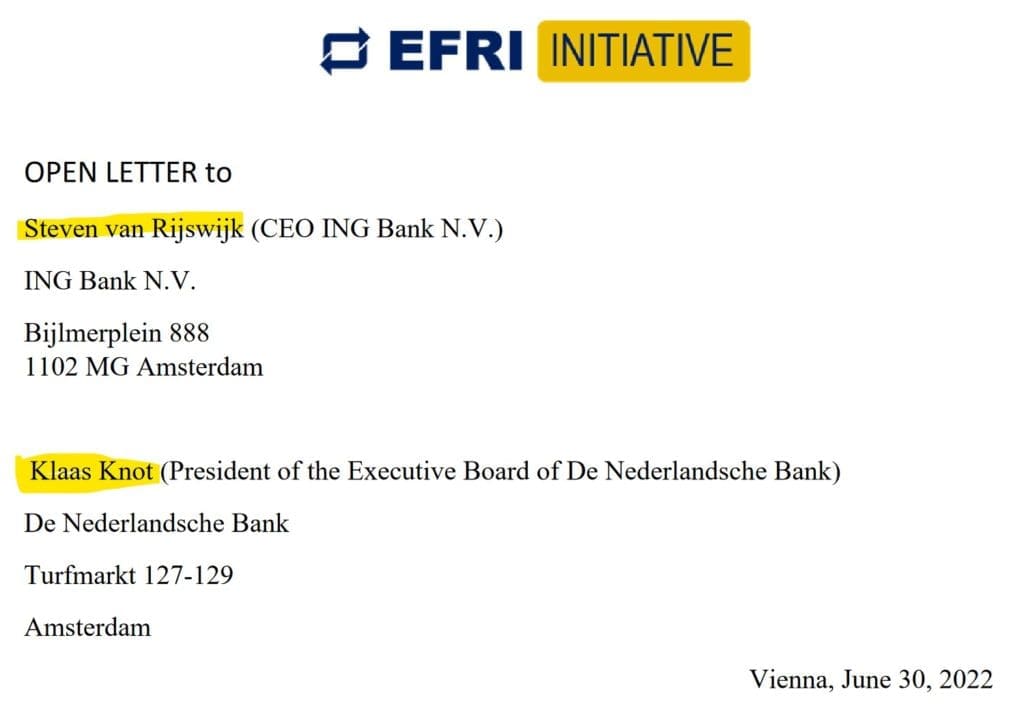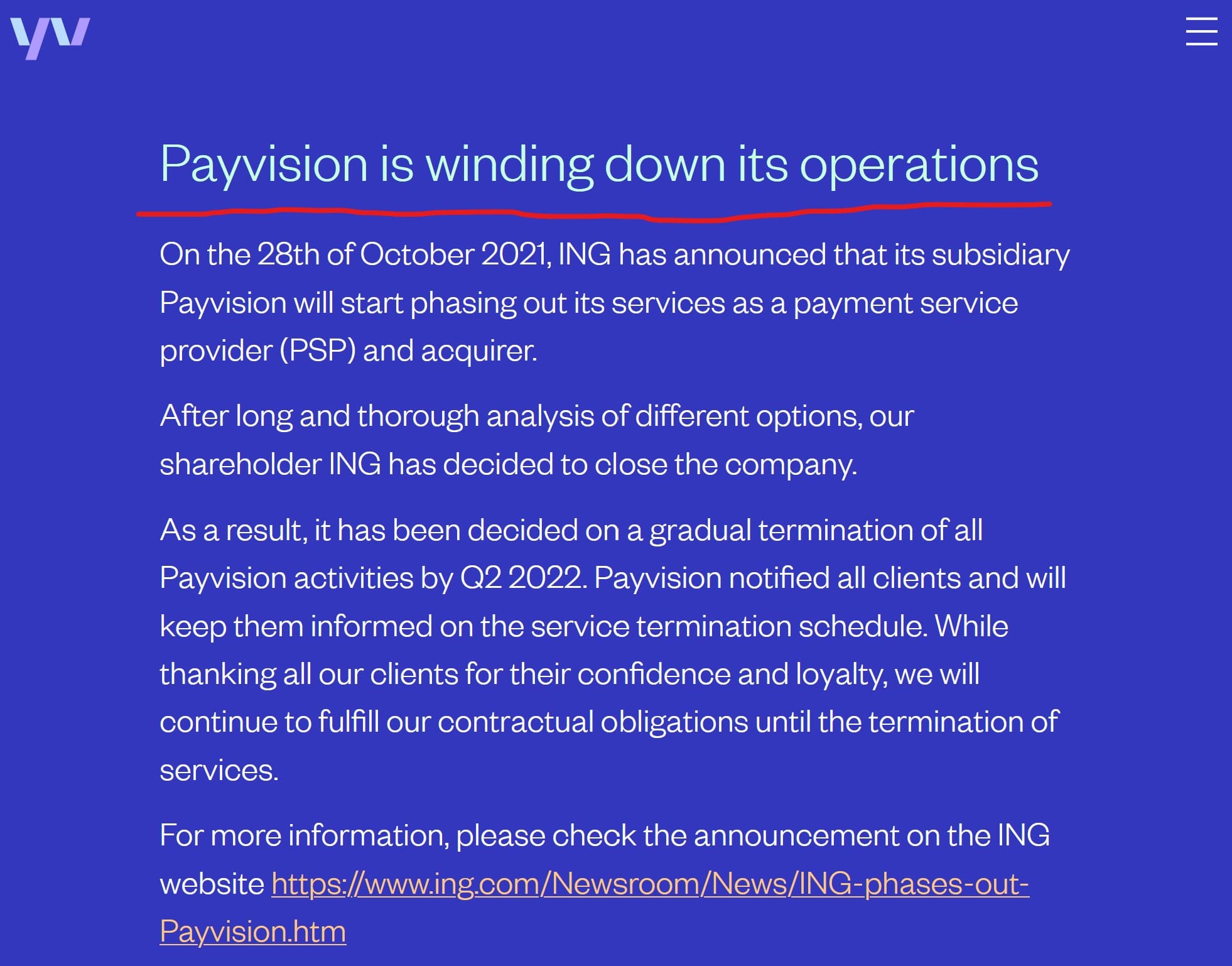Founded by Rudolf Booker in Amsterdam some 20 years ago, Payvision was acquired by ING in 2018 at a valuation of €360 million. ING then discovered that Payvision was a high-risk payment processor that primarily served ethically unacceptable industries such as porn or gambling. In addition, Payvision was a facilitator and money launderer for broker scams. In 2020, ING sold the unethical business back to the Payvision founders for a symbolic euro. In 2021, ING announced that it had decided to close Payvision after an extensive review. Currently, this closure is being processed but Payvision victims are not compensated.

The European Fund Recovery Initiative (EFRI) represents thousands of victims of broker scams. Many of them have lost their money to scammers via Payvision. EFRI alleges that Payvision management under then CEO Rudolf Booker knowingly and willingly cooperated with cybercrime masterminds such as Uwe Lenhoff and Gal Barak.
In this respect, Payvision would also be directly responsible for the damage to the victims. In an open letter to ING CEO Steven van Rijswijk and Klaas Knot, President of the Executive Committee of De Nederlandsche Bank, Elfriede Sixt, EFRI’s principal, sets out her view and demands responsibility.
[Beginn Open Letter]
Dear Sirs,
On October 28, 2021, the Dutch bank giant ING announced that it would start phasing out the business activities of its subsidiary PAYVISION as a payment service provider (PSP) and acquirer. According to the announcement, ING decided after thoroughly evaluating all options in the context of the rapidly evolving and increasingly competitive, and capital-intensive e-commerce merchant market. ING has concluded that it is not feasible to achieve its ambitions with PAYVISION.
ING also announced that they plan to complete the phase-out process for PAYVISION by today (end of the second quarter of 2022). ING promised a smooth phase-out for the PAYVISION clients and to keep them informed on the service termination schedule. The announcement came after PAYVISION’s massive involvement in European and U.S. cybercrime activities, and fraud schemes became public.
PAYVISION facilitating European cybercrime schemes
As of September 1, 2020, a Vienna Criminal Court (122 HV 4/20g) convicted the Israeli Gal BARAK for serious commercial fraud and money laundering. Gal BARAK was identified as the beneficial owner of the cybertrading scams OptionStarsGlobal, XtraderFX, and SafeMarkets. These investment scams have victimized tens of thousands of mainly European victims with a total estimated damage of € 110 Mio.
As was outlined in the judgment of the Austrian criminal court, besides the Serbian Global Payment Solutions doo (Montenegro), PAYVISION B.V. Netherlands – a 100% ING subsidiary – was the leading acquirer between September 2015 to January 2019 for the credit and debit card deposits of the transnational criminal organization of Gal BARAK. PAYVISION laundered more than € 75 Mio of the stolen money via shell companies.
Uwe LENHOFF was the beneficial owner of the cybertrading scams Option888, ZoomTraderGlobal, xmarkets, Tradovest, and Tradeinvest90. He was a friend of Rudolf BOOKER, the founder and ex-CEO of Payvision LENHOFF was found dead in his prison cell in Saarbrücken, thereby escaping accountability for victimizing thousands of older adults. The total damage of his cybertrading scams is estimated to fall short of the € 100 Mio stolen by Gal BARAK.
PAYVISION has laundered more than € 56 Mio of the stolen money for Uwe LENHOFF‘s scams since 2014 and even entered into a reseller agreement with Uwe LENHOFF in July 2021 for his being such a great connector in the scam industry.
Criminal proceedings in Europe are also underway for the cyber trading scams 24Option, GetFinancial, AlgoTechs/BEALGO, Optionbit, and Optionxp. In all these scams, PAYVISION – the ING subsidiary – did the payment processing and laundered several three-digit million amounts – stolen life savings – which ended up on offshore accounts.
PAYVISION’s participation in U.S. fraud activities
The U.S. payment facilitator AlliedWallet was another fraud facilitating client of PAYVISION. As of August 25, 2021 (Case 1:21-cr.10250-NMG), the U.S. Department of Justice resp. The District of Massachusetts filed wire fraud charges against the AlliedWallet CEO Ahmad “Andy” Khawaja, 49, and his accomplices (four people).
Ahmad “Andy” Khawaja was charged with conspiring to deceive banks and credit card companies into processing more than $150 million in credit and debit card payments on behalf of merchants involved in prohibited and high-risk businesses, including online gambling, debt collection, debt reduction, prescription drugs, and payday lending.
Three of the four suspects are arrested by now; Andy Khawaja is on the run. This indictment followed a US FTC (Federal Trade Commission) Complaint filed on May 20, 2019, against Allied Wallet for knowingly processing payments for merchants involved in fraud.
The indictment shows that PAYVISION, alongside WIRECARD – the by now exploded German payment processor was the leading Acquirer for AlliedWallet in the U.S. (as well as in Europe). The CEO of WIRECARD awaits his trial in Munich, Germany, and the COO, Jan MARSALEK, is on the run.
According to an article in the Dutch FD, as of November 11, 2020, PAYVISION also appeared in the FINCEN files handed over to the ICIJ journalists’ collective. According to those FinCEN files, starting in 2013, employees of Deutsche Bank and Bank of New York Mellon warned several times about PAYVISION’s cutting large transactions into smaller amounts for no apparent reason. Such an approach does not necessarily be illegal, but it is not a “business as usual” approach and typically triggers money-laundering alerts. Over several months, PAYVISION transferred tens of millions to a select few of the company’s customers, including Pornhub, one of the largest porn platforms in the world. (PAYVISION and Wirecard were big credit/debit card processors also for Pornhub – a Porn website being accused of promoting sex trafficking, child pornography, and sexual abuse).
Publicly available civil complaints of high-risk merchants filed against the U.S. payment processor T1 Payments and PAYVISION show that the procedure applied by AlliedWallet and PAYVISION/WIRECARD in processing stolen money for U.S./European scammers was also applied by PAYVISION for other high-risk merchants. So, more FTC actions are to be expected.
PAYVISION must have laundered hundreds of millions of stolen deposits during its existence. We assume PAYVISION resp. Rudolf BOOKER and his accomplices are red-flagged in the United States.
The questionable phasing-out approach of DNB and ING
PAYVISION is a Dutch payment services company licensed as such by and under the supervision of the Dutch Central Bank (De Nederlandsche Bank (DNB)) following the European Payment Services Directive (“PSD2”). PAYVISION has enabled and supported scammers to victimize European and U.S. retail customers for many years. They violated all regulations for due and appropriate care in onboarding customers and monitoring transactions. PAYVISION also violated all contractual obligations set for principal acquiring members of Visa Europe and Mastercard. PAYVISION miscoded, rerouted and did transaction laundering on a big scale.
No public information is available for any action undertaken by the Dutch supervisory authority against PAYVISION and its founders – although many of the business partners of Rudolf BOOKER have been convicted, arrested, or are on the run by now.
ING acquired PAYVISION at a valuation of about € 400 Mio based on wrong and misleading assumptions (we guess Uwe LENHOFF’s marketing material talking somewhat about an annual € 20 billion payment processing volume was the basis for the valuation done). Also, no public information is available that ING took severe action against Rudolf BOOKER and his accomplices for selling them a questionable company.
So, we assume that it is an “agreed procedure” between ING (the holding company) and DNB (the supervisory authority for PAYVISION) to “calmly” phase out the questionable business activities of PAYVISION after all the wrongdoings of the company got public knowledge. This phasing-out approach is supposed to solve the evident issues of DNB and ING with PAYVISION.
And honestly, we love the idea that PAYVISION is stopping doing more harm. Our issue with this calm phasing-out process ending today – June 30, 2022 – is that although ING addressed the problems of PAYVISION’s customers, neither DNB nor ING addressed the open obligations of PAVYISION against the victims.
By avoiding holding Rudolf BOOKER and his accomplices responsible for the harm done to thousands of European retail investors, both organizations fail to meet their legal and regulatory obligations. This negligence will enable BOOKER and his accomplices to continue their questionable and dangerous business activities. ING and DNB revictimize thousands of unsuspecting victims by neglecting their claims and right to justice.
The failure of DNB and ING to fulfill their legal and regulatory obligations results in thousands of victims losing their confidence in the European financial and supervisory regime. These European victims – thereof EFRI represents 300 victims – hurt by PAYVISION, have a right to justice.
We must urge you – the CEO of ING – to comply with your duty and to show that you stand up to your words in the ING’s annual report claiming that you are aware of your role in society: “We believe we can contribute to a more sustainable world by helping people improve their financial health. We align our efforts in this regard with the Principles for Responsible Banking, and we’re working with the United Nations to help set the standard for financial health impact for our industry. We’re also focusing our activities as close to our customers and communities as possible, investing in local initiatives that support vulnerable groups in those communities.”
